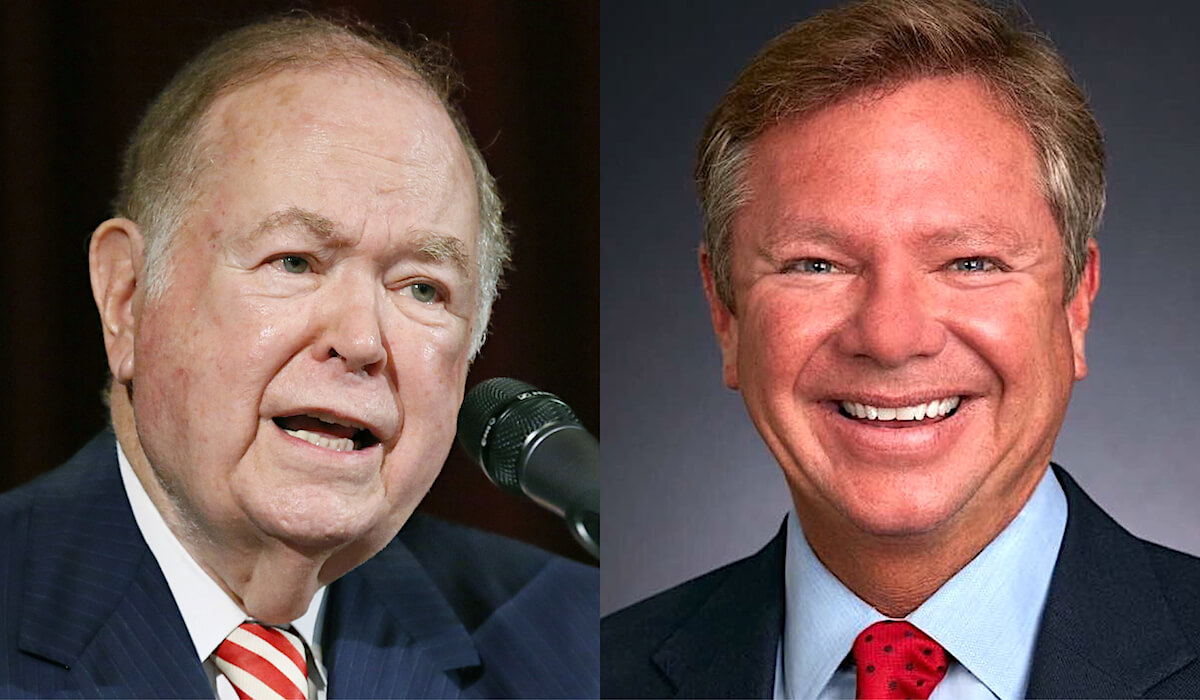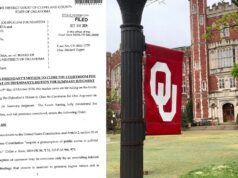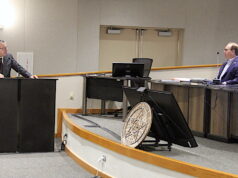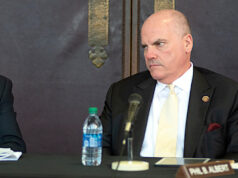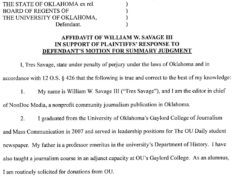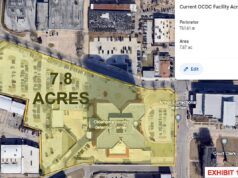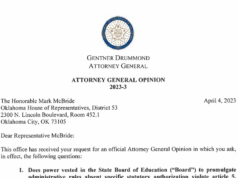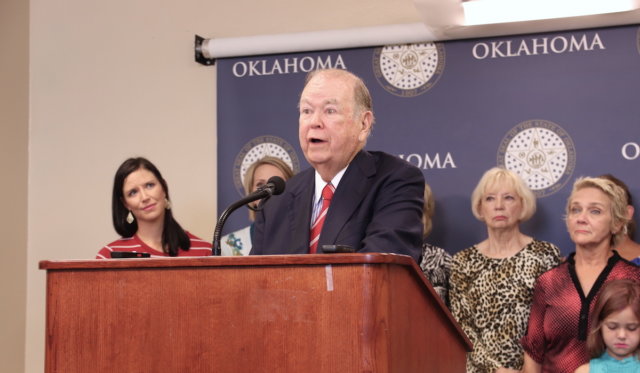

The criminal investigation of sexual misconduct allegations against former University of Oklahoma President David Boren and former Vice President Tripp Hall has continued into 2020. The pending March empaneling of a new state grand jury and revelations about Boren’s personal use of university staff highlight recent developments.
Hall, meanwhile, has faced a third public allegation of sexual misconduct, most recently from a current University of Oklahoma student named Andrew Wisdom who has sued Hall in Cleveland County District Court. Wisdom’s allegations are also being pursued by the Oklahoma State Bureau of Investigation, which started its inquiry into Boren and Hall on March 28, 2019.
“I can’t comment on an active investigation,” OSBI director Ricky Adams said Jan. 23.
Three days prior, Nolan Clay of The Oklahoman reported that OSBI had launched “a new round of interviews in a major push to wrap up their sexual misconduct investigation” of Boren. Clay listed former Gov. Brad Henry, House Minority Leader Emily Virgin (D-Norman) and OU Athletic Director Joe Castiglione among those interviewed, though the list is far more extensive.
Jess Eddy, the OU graduate who publicly accused Boren and Hall of sexual misconduct in March 2019, was not quoted in Clay’s story but said days later that he believes the state’s top law enforcement agency is pursuing allegations about Boren’s conduct that stretch back to the 1970s.
“I don’t pretend to know much about how criminal investigations work,” Eddy said. “But based on the sheer volume of allegations — the complicated and sensitive nature, not to mention how far back they go — 10 months, a year, seems pretty appropriate. I think OSBI is looking hard, and I’m grateful.”
Clark Brewster, the high-profile Tulsa defense attorney for both Boren and Hall, said earlier in January that attempts to ensnare his clients have resulted in “an empty net.”
“I think I know the facts pretty well, and we just want an end to the saga,” Brewster said. “And we certainly always have great respect for well-intentioned law enforcement or administrators or whatever in understanding the truth and understanding if there is any wrongdoing. And we facilitated in any way possible for that genuine understanding or revelation to have occurred.”
As he has done before, Brewster blamed the allegations against his clients on Jim Gallogly, a former oil executive who donated more than $20 million to OU during Boren’s tenure and who was selected as his successor.
“It’s been not just a year but nearly two years since we were launched into by Jim Gallogly, and so far it is truly an empty net,” Brewster said. “I believe that will be the final chapter.”
Decades of concern about Boren involvement with aides
Whether Brewster wants to admit it, most chapters in the story of sexual misconduct allegations against David Boren have yet to be released. OU’s lengthy report on Title IX misconduct allegations against Boren was produced by the Jones Day law firm and features an unknown level of allegations from six men with university ties. That report was provided to OSBI in May, and the agency has since interviewed other former male aides to Boren at OU and in the U.S. Senate, where he served from 1979 until his resignation in 1994.
RELATED
OU graduate alleges sexual battery by David Boren, Tripp Hall by Tres Savage
When Boren relinquished his seat in the nation’s most powerful legislative chamber to become OU president, he characterized his motivation as a frustration with Washington and an opportunity to make a dynamic impact in the field of education. But Boren was also facing mounting pressure from gay-rights activists who publicly proclaimed that Boren was the unnamed “Legislator” in Michelangelo Signorile’s groundbreaking 1993 book Queer in America: Sex, the Media and the Closets of Power. In chapter nine, Signorile uses the pseudonym “Keith” to tell the story of an aide to a federal lawmaker who was sexually harassed and pulled into a confusing physical relationship by his boss. (The book references three other male aides said to have experienced similar sexual harassment from the lawmaker.)
Signorile’s “Legislator” is described to have voted in favor of Clarence Thomas’ nomination to the U.S. Supreme Court and to have called a press conference during his first run for federal office to deny rumors that he was gay. Boren voted to confirm Thomas, and on Aug. 23, 1978, then-Gov. David Boren — a candidate for U.S. Senate — called a press conference and swore on a bible that he had never participated in “homosexual or bisexual activities, nor do I approve of or condone them.”
New multi-county grand jury set for March 3

What state investigators have discovered about Boren’s 50-plus years of public service remains unclear, but if OSBI believes it has identified criminal activity — related to sexual or financial misconduct — Oklahoma’s multi-county grand jury could be tasked with hearing evidence and deciding whether to issue indictments.
In April 2019, Oklahoma Attorney General Mike Hunter recused himself from the Boren and Hall matters and designated former U.S. attorney Pat Ryan as a special prosecutor with access to the multi-county grand jury. One of Ryan’s law partners is Dan Webber, a former legal counsel to Boren and one of several convoluted connections complicating perception of the prosecutorial situation. (Their firm, Ryan Whaley, has now been contracted by Gov. Kevin Stitt to defend a lawsuit over tribal gaming brought against the governor.)
Oklahoma’s multi-county grand jury has subpoena power to compel witnesses to appear and provide testimony under oath or produce documents and other evidence. The regular term of a multicounty grand jury is 18 months, but that can be extended to 24 months if deemed necessary.
In November, the state’s most recent multi-county grand jury was adjourned without explanation more than five months before its full statutory deadline. (View that MCGJ report here.)
Oklahoma’s next multi-county grand jury is scheduled to convene Tuesday, March 3.
State resources benefited Boren personally
On Jan. 21, The Oklahoman’s Nolan Clay also reported that Boren repaid the University of Oklahoma $4,310 in May 2019 after an internal audit examined work done on his personal property in Newcastle by university employees. Clay’s story noted that Boren had previously paid $47,593 to OU for work done by university employees on his property, dubbed “Windrush.”
Related to that story is the employment history of a woman named Tara Martin, a “managerial associate” who worked at the university’s Boyd House and Boren’s Windrush property, according to an OU email obtained by NonDoc.
In November 2013, then-OU Associate Vice President and Chief Human Resources Officer Les Hoven sent an email to other OU administrators about Martin’s compensation:
The decision has been made to fund 25 percent of Tara Martin’s salary plus fringe benefit costs through private funds from University Development. The reason for this change is to account for the time and services Tara devotes to President Boren’s private residence (Wind Rush). The amount shown below should be accounted for on a monthly basis retroactive to July 2013. I will work with payroll to ensure the remuneration for these services are included in President Boren’s W-2 income statement. Please give me a call if you wish to discuss.
“This is a matter that was considered in the course of completing a 2019 internal audit,” OU director of media relations Kesha Keith said by email Monday evening.
In 2013 when the email was sent, Tripp Hall was serving as vice president of university development, OU’s fundraising department ultimately found to have misrepresented donor data to U.S. News and World Report. At its September 2019 meeting, the OU Board of Regents rebranded the Office of University Development as the Office of University Advancement and instituted a set of policy changes, including specifications for when campus items should be named in honor of donors.
During his presidential tenure, Boren and his wife, Molly Shi Boren, had 43 tangible or endowed items named for one or both of themselves at OU, according to university records obtained by NonDoc. The items include five lounges, three statues, two boulevards, an auditorium, an atrium, a phonebooth and a golf cart. The Borens also combined to have five fellowships or scholarships, three awards, three endowments or professorships and a society created in their names.
On Monday, Clay of The Oklahoman reported that the Borens had released a list of their donations to the university during their 24 years of service. According to the story, the nearly $1.8 million total “includes $318,910 in outright cash gifts and $800,000 in salary that Boren signed over to the university, according to the breakdown.” The Borens also donated valuable paintings and sculptures “from their personal collection.”
“This quiet generosity of the Borens deserves comment in light of the spiteful harangue from Mr. Boren’s successor that unleashed a costly investigation — in dollars and personal anguish — which we pray will soon be over,” Brewster, the attorney for David Boren and Tripp Hall, told The Oklahoman.
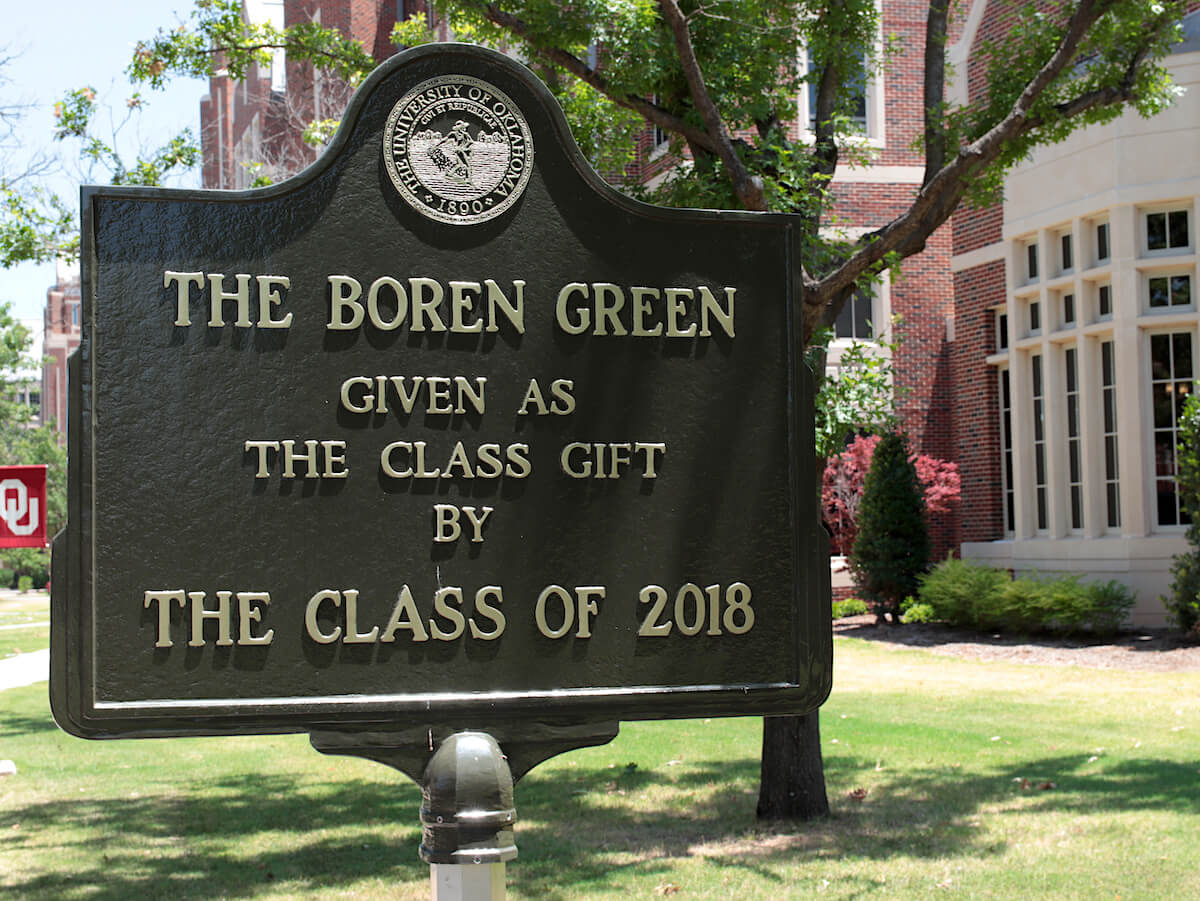
David Boren left Globe Life board in April
For 25 years after leaving the U.S. Senate, David Boren has earned millions of dollars serving on the executive boards of large companies. The practice is not uncommon among former high-ranking federal lawmakers. Since 2003, Securities and Exchange Commission records indicate Boren has sold more than $8.8 million in stock earned through board service for companies including:
- American Airlines
- Continental Resources
- Globe Life (formerly Torchmark Corporation)
- Texas Instruments
- ConocoPhillips
- Hiland Partners, LP (an oil and gas midstream company started in 1990 as a subsidiary of Continental Resources. The company went public in 2005 before Continental owner Harold Hamm bought out unit holders in 2009 to return it to a private company, which he sold to Kinder Morgan in 2015.)
In August, Boren sold 10,900 shares of Globe Life stock at $87.02 per share for a total of $948,518. The stock price has climbed in the months since and now stands at $103. Boren’s sale came about four months after he retired from the insurance company’s board, according to an SEC filing:
David L. Boren and Paul J. Zucconi retired from the Torchmark Corporation Board of Directors immediately prior to the annual meeting of shareholders on April 25, 2019.
Globe Life was originally founded by John Singletary and Ralph Reece in 1951 and taken public in 1965 after Reece’s death. The Singletary family hosted fundraisers for Boren during his political career. John Singletary died Jan. 1, 1977, and was survived by his wife, Lois Virginia Singletary, and children.
In 2019, Boren also left the board of Democratic presidential candidate and New York City billionaire Michael Bloomberg’s Bloomberg Family Foundation. Cached versions of the foundation’s website indicate Boren’s name was removed from its board of directors between Oct. 29 and Nov. 21. Bloomberg officially entered the 2020 presidential race on Nov. 24.
OU Board of Regents to meet this week
The University of Oklahoma Board of Regents will meet both Wednesday, Jan. 29, and Thursday, Jan. 30. This morning, OU released its schedule and agenda for the week’s meetings, which include an executive session at 8:30 a.m. Wednesday.
Both days’ meetings will occur in the Robert M. Bird Library on the OU Health Sciences Center campus in Oklahoma City.
(Update: This story was updated at 11:40 a.m. Tuesday, Jan. 28, to reference the OU Board of Regents’ newly released agenda.)









